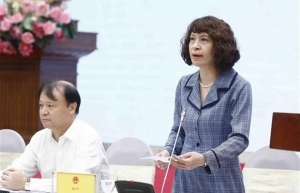The legal adaption measures expected from pharma groups
Marketing authorisations (MAs) have been a pressing issue among multinationals and the Vietnamese government and the Ministry of Health (MoH) has made a number of actions to deal with it. What is the current situation?
 |
| Tran Ngoc Anh, representative of the US-ASEAN Business Council |
Member companies of the US-ASEAN Business Council highly valued the issuance of Resolution No.12/2021/UBTVQH15 at the end of 2021, which enabled the continued use of MAs scheduled to expire before the end of 2022. The MoH then issued a list of about 10,000 drugs with MAs expired in 2021 and extended until the end of 2022, thus creating favourable conditions for the drugs to continue their imports into Vietnam and ensuring supply for hospitals to meet examination and treatment demands.
Until now, all the issues related to MA for the drugs in 2022 have been dealt with. However, starting from January 2023, these 10,000 drugs and around 8,000 others will then expire. We are very concerned about this issue. Businesses have reported the problem to the MoH and the government, proposing a timely mechanism and solution to help them get out of the impasse.
We expect the government and National Assembly (NA) will allow continued use of MA for the 18,000 pharmaceuticals until the end of this year. At present, our business members are very concerned about the rules that require them to renew the MA every 12 months. This has caused difficulties for pharma firms and resulting in a shortfall of drugs at public-run hospitals in recent times.
Recently, the government has had many meetings with ministries, agencies, businesses, and state-owned hospitals to discuss the possible solutions. As the extension of the MA goes against the Law on Pharmacy, the government has to seek for approval from the NA and we are waiting for solutions from the NA to completely solve the problem.
Besides MAs, drug tenders have been another challenge facing domestic and international pharmaceutical companies. What are the present obstacles?
At present, pharma businesses are still facing numerous hurdles in drug tenders due to administrative procedures and legal barriers. For example, the approval of the list of brand-name drugs remains slow, thus making businesses unable to join tenders.
Moreover, current rules about the list of pharmaceuticals subject to health insurance payment are out of date and inappropriate. The list is subject to an adjustment every 3-4 years. This process is so long that new and innovative drugs cannot be updated and included timely, thus hindering local patients from getting access to them, though they are in a strong need.
We propose an adjustment every 1-2 years, while having a concrete process to quicken adding new drugs to the list to increase patients’ accessibility.
The Law on Pharmacy is expected to be amended to further facilitate business activities and to meet future development of the sector. Which regulations should be taken into consideration?
The business community is expecting the NA will allow the continued use of MA for drugs until the end of 2024 or 2025, when the amended Law on Pharmacy is expected to come into effect.
We are happy to work with the MoH and relevant ministries and agencies on the amendments of the Law on Pharmacy to solve the existing problems and barriers, to quicken the process of granting MA for new pharmaceuticals.
We look forward to the revision of relevant regulations with the aim of implementing the removal of the MA renewal procedure soon, and mechanism reform towards completely abolishing the price registration of drugs. For example, as ruled by the MoH, pharma firms have to report their price mechanism to the ministry’s Drug Administration of Vietnam (DAV).
Only when the DAV approves a price mechanism and announces it on its website, will pharma firms be able to join tenders, or selling their drugs in the market. This regulation causes challenges for businesses because it is not reasonable for the DAV to approve businesses’ cost items. Only independent audits check documents to see whether their cost items are reasonable or not.
Worse still, this rule even goes against with the Law on Prices and its decree guiding the law. No state agencies should approve cost items of businesses. Price of products should be decided by businesses and regulated by the market to ensure healthy competitiveness.
 | Legal framework sought for Vietnam’s biopharma sector While players are betting much more on the high growth potential in Vietnam’s biopharma sector, they are still struggling to move ahead because of legal holes that prevent strong international partnerships. |
 | Domestic pharmaceutical firms encouraged to produce rare medicines: official The Ministry of Health (MoH) will propose to the Government to issue policies aimed at encouraging domestic pharmaceutical enterprises to produce rare medicines in order to ensure domestic supply, said Deputy Minister of Health Nguyen Thi Lien Huong said at the Government’s regular press conference on October 29. |
What the stars mean:
★ Poor ★ ★ Promising ★★★ Good ★★★★ Very good ★★★★★ Exceptional
Themes: Healthcare Platform
- Opella and Long Chau join forces to enhance digestive and bone health
- Hanoi intensifies airport monitoring amid Nipah disease risks
- Cosmetics rules set for overhaul under draft decree
- Policy obstacles being addressed in drug licensing and renewal
- Sanofi, Long Chau Pharmacy relaunch medicine blister pack collection initiative
Related Contents
Latest News
More News
- A golden time to shine within ASEAN (February 19, 2026 | 20:22)
- Vietnam’s pivotal year for advancing sustainability (February 19, 2026 | 08:44)
- Strengthening the core role of industry and trade (February 19, 2026 | 08:35)
- Future orientations for healthcare improvements (February 19, 2026 | 08:29)
- Infrastructure orientations suitable for a new chapter (February 19, 2026 | 08:15)
- Innovation breakthroughs that can elevate the nation (February 19, 2026 | 08:08)
- ABB Robotics hosts SOMA Value Provider Conference in Vietnam (February 19, 2026 | 08:00)
- Entire financial sector steps firmly into a new spring (February 17, 2026 | 13:40)
- Digital security fundamental for better and faster decision-making (February 13, 2026 | 10:50)
- Aircraft makers urge out-the-box thinking (February 13, 2026 | 10:39)

 Tag:
Tag:


















 Mobile Version
Mobile Version